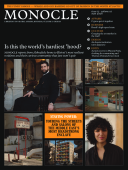
Issue 13
Is this the world’s hardiest ’hood? Monocle reports from Ashrafieh: home to Beirut’s most resilient residents and their curious community that just won’t quit.
In This Issue
Oops! No content was found.
Looks like we no longer have content for the page you're on. Perhaps try a search?
Return Home

